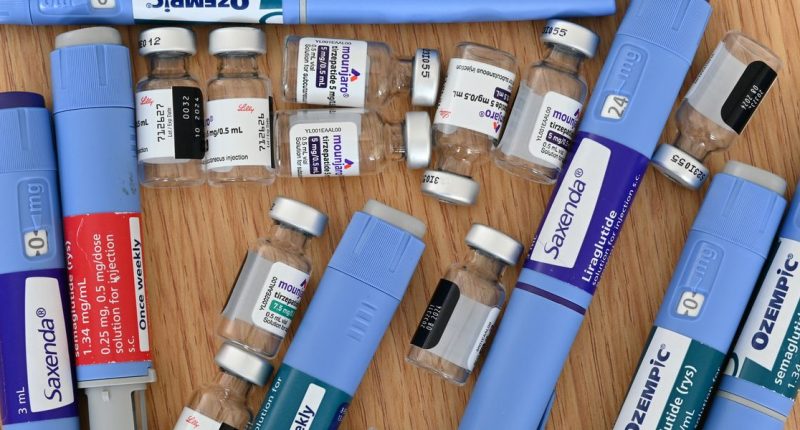The UK’s medicines regulator has received over 100 reports of deaths potentially associated with widely used weight loss injections such as Mounjaro and Wegovy.
According to the Medicines and Healthcare products Regulatory Agency (MHRA), 111 fatalities have been recorded up to May 29 in connection with glucagon-like peptide-1 receptor agonists (GLP-1RAs) — the class of drugs that include Mounjaro, Wegovy, Saxenda, and Ozempic.
While these reports do not establish that the medications directly caused any of the deaths, the MHRA noted that they raise a “suspicion” of a possible link.
The information stems from its Yellow Card scheme, a long-standing system that allows healthcare professionals and the public to report suspected adverse drug reactions.
Among the drugs flagged, Saxenda (liraglutide) was associated with the highest number of fatal cases, accounting for 37.
Mounjaro (tirzepatide) followed closely with 33 reports, and semaglutide — marketed for weight loss as Wegovy and for type 2 diabetes as Ozempic — was linked to 30.
- Cardio after weights is the most beneficial training pattern
- Experts warn of osteoporosis risk after research finds weight loss jabs cause loss of muscle and bone mass
- Overweight teenage boys can damage genes of future children
Trulicity (dulaglutide) and Lyxumia (lixisenatide) were cited in seven and five reports, respectively.
Of the total reported deaths, 32 involved medications prescribed specifically for weight loss. A total of 40 cases were tied to diabetes treatments, while another nine involved people using the drugs for both conditions. A further 30 reports did not specify a clear medical indication.
The issue gained fresh attention following the death of 58-year-old Susan McGowan, a nurse from Scotland, who suffered fatal complications shortly after starting Mounjaro.
Her death remains the only one in the UK officially confirmed to be directly related to one of these medications.
Despite the rising concern, the government is planning to widen access to GLP-1RA medications as part of a broader strategy to tackle obesity.
These injections, once hailed as a medical breakthrough, have become increasingly popular — even among individuals without clinical obesity — prompting calls for tighter prescribing controls.
Medical professionals have sounded the alarm over a growing number of otherwise healthy individuals, particularly younger women, misusing these medications to quickly slim down.
The current system allows users to obtain prescriptions through online consultations by submitting personal details such as height, weight, and photographs. However, concerns are mounting that this model is too lenient and could lead to misuse.
Organisations including the Society for Acute Medicine have urged regulators to strengthen oversight of how these medications are distributed and prescribed, warning of the potentially serious risks involved.
- Lifespan increased by losing weight during midlife
- Weight loss drugs may cause nutrient deficiencies
- Mental health improved by weight loss jabs, study suggests
Although the Yellow Card data cannot prove cause and effect, it remains a vital tool for monitoring drug safety across the country, helping to identify trends and emerging concerns before they escalate further.
A spokesperson for Lilly UK, the makers of Mounjaro, said: “Regulatory agencies conduct extensive independent assessments of the benefits and risks of every new medicine and Lilly is committed to continually monitoring, evaluating, and reporting safety data.
“If anyone is experiencing side effects when taking any Lilly medicine, they should talk to their doctor or other healthcare professional.”
Concerns are mounting over the side effects associated with popular weight loss injections.
Reported reactions have ranged from gastrointestinal issues like nausea, vomiting, and diarrhoea to more serious complications such as bone fractures, dental problems, and severe mental health impacts, including anxiety and depression.
Earlier this month, several women came forward describing disturbing psychological symptoms after taking Mounjaro.
Despite these concerns, Mounjaro and similar medications — including Ozempic and Wegovy — have been shown to support significant weight loss, with some patients shedding up to 15% of their body weight within a year.





